Black grapes are distinguished by their high anthocyanin content, a natural pigment that contributes to the rich color of grapes and also serves as a powerful antioxidant. This can help improve brain function, reduce inflammation, and support cardiovascular health, particularly in preventing strokes during the cold season.
Health Benefits of Black Grapes
The nutrients found in black grapes include polyphenols, which are powerful antioxidants, as well as various essential vitamins and minerals.
Below are the health benefits of black grapes along with an answer to the question of whether black or red grapes are better…
1. Advantages of Black Grapes for Health
Black grapes stand out for their high anthocyanin content, which is a natural pigment contributing to the deep color of the grapes and a potent antioxidant that can help improve brain function, reduce inflammation, and support cardiovascular health to prevent strokes during the cold season. In addition, black grapes also contain resveratrol, another beneficial polyphenol for health.
1.1. Delicious and Nutrient-Rich
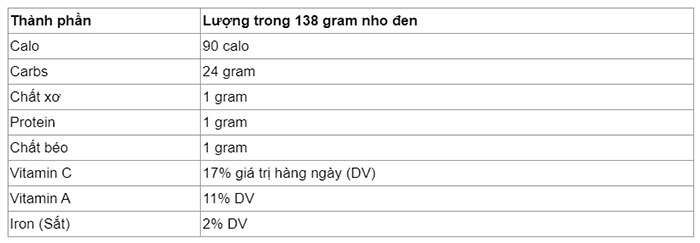
Black grapes have a distinctive sweet and fragrant flavor that is easy to eat, even for young children. A serving of 138 grams of black grapes contains:
Black grapes primarily provide carbohydrates and contain almost no fat or protein. They are a good source of vitamins C and A. Vitamin C helps improve iron absorption, collagen production, and boosts the immune system, making it a powerful antioxidant. Vitamin A is involved in immune function, cell development and growth, and eye health.
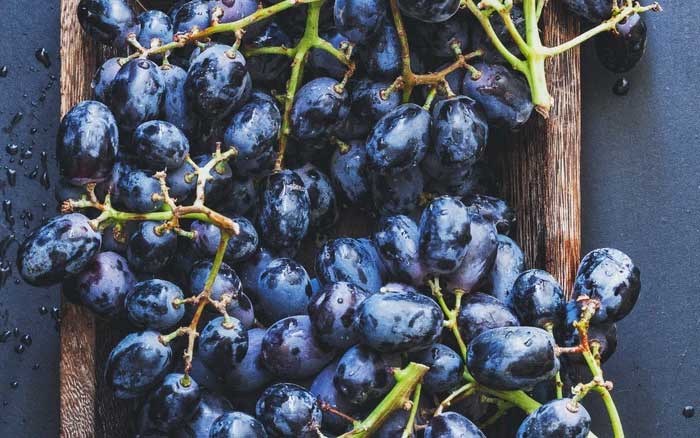
Nutrient-rich black grapes. (Photo: Internet)
1.2. Rich in Antioxidants
In addition to their high vitamin C content, black grapes also contain various antioxidants. Antioxidants are compounds that help combat oxidative stress, which occurs when there is a high amount of free radicals in your body. Oxidative stress plays a significant role in increasing the risk of chronic diseases such as diabetes, Alzheimer’s, Parkinson’s, heart disease, and cancer.
Black grapes contain a considerable amount of polyphenols, a type of compound with strong antioxidant capabilities.
As mentioned earlier, the characteristic color of black grapes comes from their anthocyanin content—the main polyphenol found in black grapes. Another significant antioxidant found in black grapes is resveratrol, known for its potential anti-cancer, anti-inflammatory, and anti-aging benefits; particularly its protective effects on the heart and brain.
Most of the antioxidants in black grapes are concentrated in the skin, which contains a significant amount of other antioxidants, including catechin and epicatechin, caffeic acid, catechin gallate epicatechin, and gallic acid. The seeds of grapes are also rich in these beneficial compounds.
| During the cold season, the immune system has to work harder to combat infections such as colds and flu; thus, antioxidants can support the immune system by reducing the burden of oxidative stress. Additionally, consuming antioxidant-rich foods like fruits and vegetables can provide nutritional benefits and enhance overall health during the cold season. |
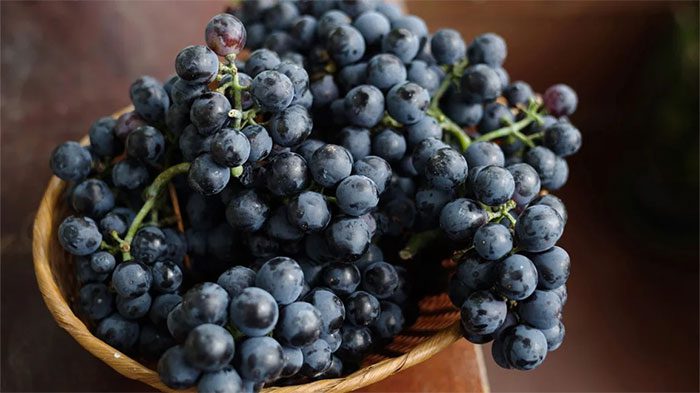
In addition to their high vitamin C content, black grapes also contain various antioxidants. (Photo: Internet)
1.3. Boosts Cardiovascular Health
The antioxidant effects of anthocyanins and resveratrol have been linked to a reduced risk of heart disease. Therefore, adding black grapes to your diet may support heart health.
For instance, anthocyanins can protect against atherosclerosis—the condition characterized by plaque buildup in your arteries—by reducing oxidative stress and inflammation.
Moreover, they can decrease arterial stiffness, leading to improved blood flow and lower blood pressure. Anthocyanins may also lower both total cholesterol and bad cholesterol—LDL.
Regarding resveratrol, studies in vitro and in animals suggest that it may also improve the function of your blood vessels. Furthermore, resveratrol can inhibit inflammation and prevent plaque buildup, potentially reducing your risk of atherosclerosis and stroke.
|
During the cold season, the risk of cardiovascular disease can increase due to various factors. Cold weather may elevate blood pressure and constrict blood vessels, which can put stress on the heart. Low temperatures can also increase the likelihood of blood clotting, thus raising the risk of forming clots that may lead to heart attacks or strokes. Additionally, in winter, people may be less active and tend to consume more calorie-dense and fatty foods, which can contribute to the development of cardiovascular disease. |
1.4. Prevents Diabetes
The polyphenols in black grapes may also have anti-diabetic effects by managing your blood sugar levels.
Diabetes is characterized by persistently high blood sugar levels and a decreased ability to regulate insulin production. According to Healthline, studies in vitro have shown that resveratrol can activate a protein called sirtuin 1 (SIRT1) that helps reduce insulin resistance.

Polyphenols in black grapes may also have anti-diabetic effects by managing your blood sugar levels. (Photo: Internet)
Furthermore, studies in animals suggest that resveratrol may also reduce insulin resistance and improve the insulin secretion ability of the pancreas. This may help reduce diabetes-related complications.
Additionally, human studies show that resveratrol may also improve the ability to regulate blood sugar control and reduce insulin resistance if you have type 2 diabetes.
However, more clinical studies are needed to fully understand the impact of resveratrol on blood sugar control, as evidence from current studies is not consistent.
Cold weather can affect the ability to regulate blood sugar. Decreased temperatures can increase the risk of hypoglycemia as the body attempts to keep warm, which may in turn elevate energy expenditure.
Moreover, winter may lead to less physical activity, resulting in reduced insulin sensitivity. Illness-causing viruses like colds or flu, which are more common during the cold season, can also cause fluctuations in blood sugar levels.
Additionally, individuals with diabetes who wish to eat grapes need to reduce their sugar intake in their daily diet. The amount of grapes that can be consumed may vary, approximately around 15 small grapes; overeating can lead to elevated blood sugar levels.
1.5. May Provide Anti-Cancer Properties
Resveratrol and anthocyanins may give black grapes their anti-cancer potential.
According to Healthline, research shows that both of these antioxidants can help combat cancer cells by preventing the growth and spread of tumors. In vitro studies have also shown the anti-cancer effects of resveratrol against various types of cancer, including stomach, breast, liver, thyroid, ovarian, and prostate cancers.
Similarly, in vitro and animal studies also support the anti-cancer effects of anthocyanins against stomach, skin, colorectal, cervical, and breast cancers.
However, large-scale human studies have not shown a lower risk of most cancers in people after consuming anthocyanins. Therefore, further research is needed to determine whether incorporating black grapes into the daily diet can prevent cancer.
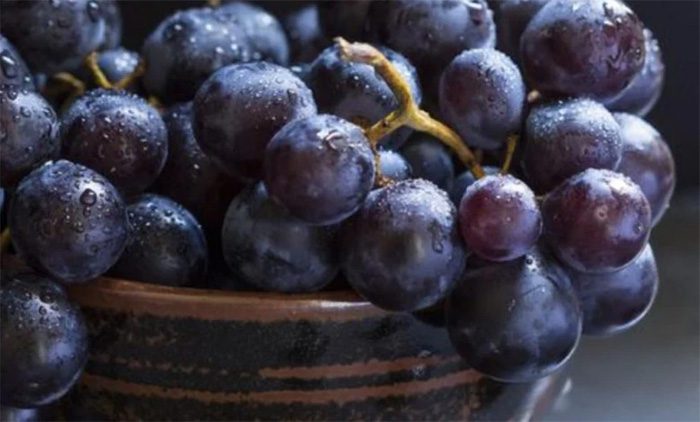
Resveratrol and anthocyanins may give black grapes their anti-cancer potential. (Photo: Internet).
1.6. May Slow the Progression of Alzheimer’s Disease
Resveratrol may slow the progression of Alzheimer’s disease. According to WebMD, scientists have found that moderate wine consumption may reduce the risk of memory loss. In animal studies, mice treated with resveratrol showed improved memory and brain function.
Researchers have discovered several chemical links between resveratrol and brain health; however, more research is needed before we can draw definitive conclusions.
1.7. Combating Obesity
Resveratrol and another compound found in black grapes called pterostilbene have been shown to have anti-obesity effects in laboratory studies and on animals.
Both of these components appear to help the body improve gut bacteria and regulate energy, but more testing is needed to determine whether they can combat obesity in humans.
1.8. Other Potential Health Benefits of Black Grapes
The potential benefits of black grapes have not been as extensively studied as the effects mentioned above. For example:
May Enhance Skin Health
Research indicates that antioxidants such as anthocyanins in black grapes are effective not only against skin cancer but also in treating mild skin issues like acne.
Additionally, antioxidants from black grapes may protect the skin from harmful effects of UV radiation, which often includes sunburn, swelling or water retention, pigmentation, and skin cancer. UV radiation has also been shown to promote the production of free radicals and oxidative stress, which can lead to premature skin aging – characterized by wrinkles, dry skin, or the appearance of fine lines.
Although black grapes and their extracts are being considered for herbal cosmetic formulations, most of their effects rely on direct application to the skin rather than consumption of the fruit. Eating black grapes may not exhibit the same potential as topical creams when it comes to improving skin health.
May Provide Antibacterial Properties
The antioxidants found in the skin of black grapes may act as antibacterial agents that can inhibit the growth of antibiotic-resistant bacteria and toxin-producing fungi.
In vitro studies have shown that their antibacterial activity significantly prevents the growth of foodborne pathogens such as Staphylococcus aureus, Enterococcus faecalis, and Enterobacter aerogenes. Similarly, their antifungal activity appears to be effective against toxin-producing fungi like Penicillium chrysogenum, Penicillium expansum, Aspergillus niger, and Aspergillus versicolor.
However, studies on whether eating fruits like black grapes leads to the same effects as testing with compounds are still lacking.
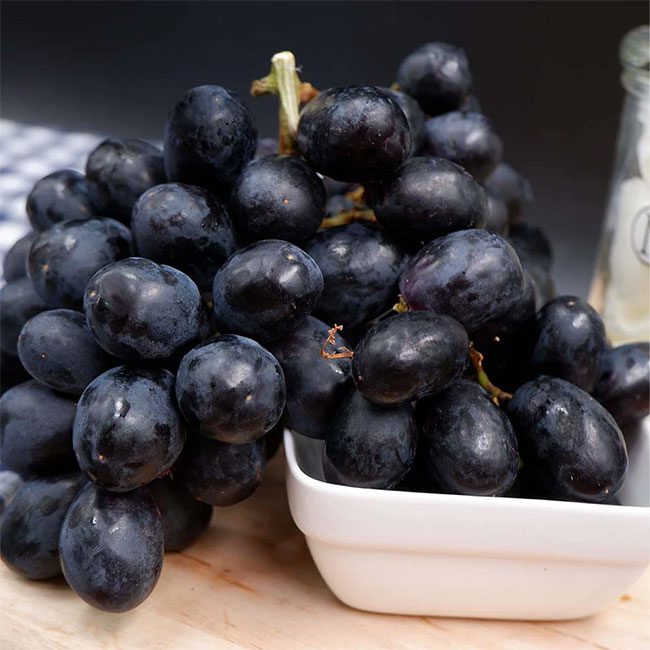
The antioxidants found in the skin of black grapes may act as antibacterial agents. (Image: Internet).
Promotes Hair Growth
In vitro, animal, and human studies suggest that the antioxidant compound resveratrol may promote hair growth by stimulating the transition of hair cycles from the telogen phase (resting) to the anagen phase (growth).
Additionally, these compounds may protect hair follicles from oxidative stress and increase hair thickness. However, these effects also depend on resveratrol being applied directly to the scalp, so research on the effects of consuming black grapes on hair growth still requires more evidence.
2. Is Eating Black Grapes or Red Grapes Better for Health?
Below is a basic comparison table between black grapes and red grapes based on their typical nutritional values:
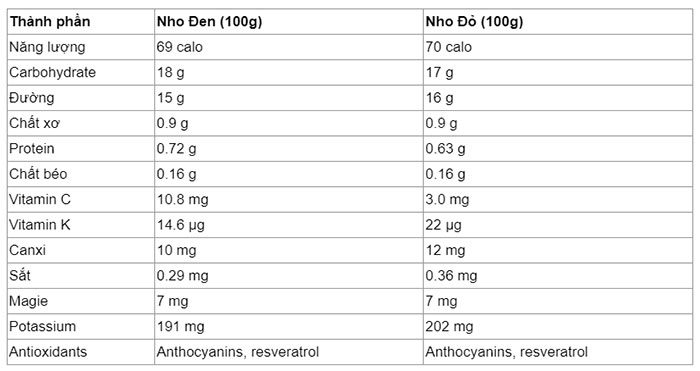
The choice between eating black grapes or red grapes depends on your specific health goals and personal preferences. Both types of grapes are rich in antioxidants such as resveratrol, anthocyanins, and polyphenols, but there are some minor differences between them.
Black grapes typically contain resveratrol in their skins, a powerful antioxidant that may help fight diseases, including heart disease and certain cancers. Resveratrol has also been studied for its strong antioxidant properties, helping to combat cancer, inflammation, and aging; particularly offering protective effects for the heart and brain.
Red grapes also contain antioxidants but may have higher levels of anthocyanins, the antioxidants that give red grapes their color and are associated with various health benefits.
Both types of grapes are healthy choices, and adding them to your diet can provide numerous health benefits. It is important to choose based on your preferences and to diversify your diet to receive a wide range of nutrients.
Overall, black grapes may offer many health benefits, and if you have a history of allergies to berries, be cautious when consuming them and consult with a doctor for further guidance. It is recommended to consume about 200 grams of grapes per day to avoid excessive sugar intake, especially for those who are trying to lose weight.


















































